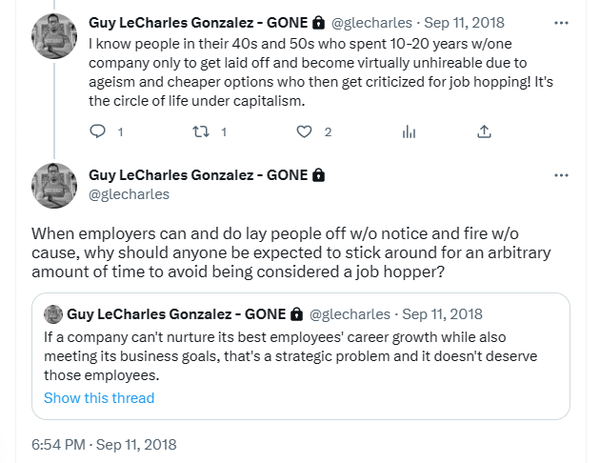Throughout my career in publishing, I’ve developed a knack for gravitating towards… let’s say “challenged” media companies on the verge, or in the midst of often self-fulfilling “disruption” and overdue transformation. Chalk that up to a combination of preferring to work within niche communities I have some personal interest in, the many downsides of private equity ownership and ad-driven B2B media, and/or any given Tuesday in the media business. Despite frequently joking that one day I’d work for the Yankees—theoretically Conde Nast or Random House—over time I came to embrace the never-ending challenges and the fixer role that would inevitably end up defining my job regardless of what my actual title and official job description declared at the time.
My resume over the past 15 years in particular has had an underlying theme of frying pan to fryer to frying pan, and for the most part, it’s been an educational and rewarding ride. One of the biggest and most useful lessons has been what it takes to be a leader in the midst of a crisis, whether that’s an important project going off the rails, unfavorable budget reforecasts halfway through the year, or layoffs—real leadership is defined by how you handle crisis, not success. Unfortunately, those moments of crisis are often kept under wraps while they’re happening, negative outcomes get positive spins, and maybe a couple of senior executives get pushed out mid-flight, with parachutes, usually to land safely in similar roles at similar companies with little incentive to acknowledge or learn from their mistakes, and no public trail of the damage they caused along the way. (Meanwhile, millennials are criticized for job-hopping with no examination of the underlying reasons!)
The media business is tough and always has been, and anyone in it for more than a few years knows there will be ups and downs, some predictable, some unexpected. The downs can be brutal, and depending on your senior executives’ leadership ability, the ride can either be a galvanizing challenge or a demoralizing slog for the rest of the staff.
My Favorite Boss
“As a leader you need to drive through challenges… you need to come up with a plan, come up with a vision, and create what happens next for your organization.” Dominique Raccah
I never had the pleasure of working for Raccah, but I’ve been a fan of hers for years (she was an invaluable adviser during my DBW days), and I consider her one of the smartest, most innovative executives I’ve ever dealt with in the media/publishing business. Her perspective on leadership is similar to my all-time favorite boss (FBF?), a colleague who took on a publisher role in a challenging environment despite having no publishing background—he was a lawyer, entrepreneur, well-rounded business guy, and genuine leader—and made it work largely because he believed in the importance of three critical things: budgeting, communication, mission.
BUDGETING
Every business has a budget that dictates its priorities, expectations, and capabilities, and the best ones are developed strategically and holistically, with a clear understanding of what’s driving growth and where the risks are. The worst are just spreadsheets with percentages plugged in “projecting” growth with no actionable strategy or investment to actually drive it. The latter typically result in demoralizing “expense management” exercises in Q3 and Q4, and headcount reductions that sacrifice doers to save the executives who created and/or exacerbated the problems.
After his first year inheriting an unrealistic budget, my FBF committed to a transparent budgeting process that included his management team, ensuring the final budget was something we all weighed in on and bought into. Regardless of where the final budget ended up after the board reviewed it, that collaborative process ensured we were all confident that what was presented was a realistic stretch with necessary resources accounted for, and any adjustments or reforecasting were addressed in similar, collaborative fashion.
COMMUNICATION
When going through a rough period, there’s nothing worse than a boss who can’t, or won’t, offer any insights into what’s happening, or present a coherent strategy to overcome the challenges. Even worse, when the layoffs come out of left field. A put-upon staff left in the dark too long is a disengaged staff updating their resumes.
The “need” for layoffs rarely comes out of left field in the media business, and open communication about the state of the union can keep staff engaged during tough times while also enabling individuals to make informed decisions about their own fate. When we faced the prospect of layoffs one year, it was identified early and a collaborative analysis was done to determine how to proceed and people were given notice rather than unexpectedly being ushered out of the office right before the holidays or on a random Tuesday. A manager unwilling to treat staff like humans rather than “human resources” isn’t a real leader and doesn’t deserve two weeks notice. From budgeting to key initiatives to periodic check-ins on overall company health, consistent communication is invaluable, especially during a crisis.
MISSION
Disruption and transformation have been tired buzzwords in the media business for years, but having a clearly defined mission that’s aligned with business goals and drives strategic planning is grossly underrated. When times are tough, the difference between staff driving through challenges or looking for their next gig can often come down to the personal appeal of the company’s mission statement and how committed the company actually is to it. Few people are inspired by margins and EBITDA, and in a private equity setting most staff typically aren’t going to see any financial benefits from the expected sale 3-5 years down the road that will enrich a select few “key” executives, so the mission statement can serve as a reminder why the challenges are worth fighting through, and the successes worth savoring.
In our 3rd year we initiated a mission and vision process with the entire staff that not only helped us clearly define our role in the communities we served but also helped guide our strategic planning. If it didn’t align with our mission, it didn’t belong in the budget. If it did, it had resources dedicated to making it viable. It also served as an internal reference point to remind us all why the work we were doing had value, not just for the board’s quarterly benchmarks and ultimate goal to sell the company—something they did successfully twice in less than 5 years, largely thanks to FBF’s efforts—but to reinforce the personal connections many of us had to the communities we served.
While there are different ways to lead and different styles of leadership, without the ability to develop realistic budgets, communicate consistently and transparently with staff, and define a compelling mission and vision for all to rally around, they’re just meaningless personality traits.
If it’s raining outside, don’t sing me “the sun’ll come out tomorrow,” give me a damn umbrella.
Photo by mehul dave on Unsplash
Do you like email?
Sign up here to get my bi-weekly "newsletter" and/or receive every new blog post delivered right to your inbox. (Burner emails are fine. I get it!)



